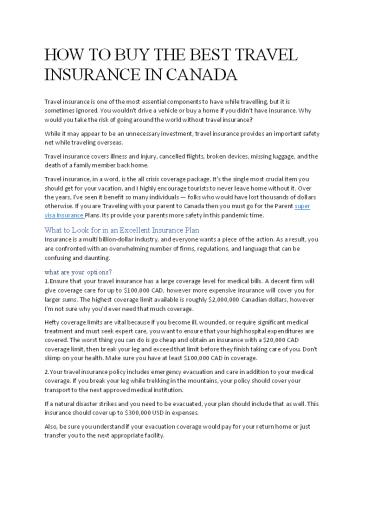How to buy best travel Insurance In canada PowerPoint PPT Presentation
Title: How to buy best travel Insurance In canada
1
HOW TO BUY THE BEST TRAVEL INSURANCE IN CANADA
- Travel insurance is one of the most essential
components to have while travelling, but it is
sometimes ignored. You wouldn't drive a vehicle
or buy a home if you didn't have insurance. Why
would you take the risk of going around the world
without travel insurance? - While it may appear to be an unnecessary
investment, travel insurance provides an
important safety net while traveling overseas. - Travel insurance covers illness and injury,
cancelled flights, broken devices, missing
luggage, and the death of a family member back
home. - Travel insurance, in a word, is the all crisis
coverage package. It's the single most crucial
item you should get for your vacation, and I
highly encourage tourists to never leave home
without it. Over the years, I've seen it benefit
so many individuals folks who would have lost
thousands of dollars otherwise. If you are
Traveling with your parent to Canada then you
must go for the Parent super visa Insurance
Plans. Its provide your parents more safety in
this pandemic time. - What to Look for in an Excellent Insurance Plan
- Insurance is a multi billion-dollar industry, and
everyone wants a piece of the action. As a
result, you are confronted with an overwhelming
number of firms, regulations, and language that
can be confusing and daunting. - what are your options?
- Ensure that your travel insurance has a large
coverage level for medical bills. A decent firm
will give coverage care for up to 100,000 CAD,
however more expensive insurance will cover you
for larger sums. The highest coverage limit
available is roughly 2,000,000 Canadian dollars,
however I'm not sure why you'd ever need that
much coverage. - Hefty coverage limits are vital because if you
become ill, wounded, or require significant
medical treatment and must seek expert care, you
want to ensure that your high hospital
expenditures are covered. The worst thing you
can do is go cheap and obtain an insurance with a
20,000 CAD coverage limit, then break your leg
and exceed that limit before they finish taking
care of you. Don't skimp on your health. Make
sure you have at least 100,000 CAD in coverage. - Your travel insurance policy includes emergency
evacuation and care in addition to your medical
coverage. If you break your leg while trekking in
the mountains, your policy should cover your
transport to the next approved medical
institution. - If a natural disaster strikes and you need to be
evacuated, your plan should include that as well.
This insurance should cover up to 300,000 USD
in expenses. - Also, be sure you understand if your evacuation
coverage would pay for your return home or just
transfer you to the next appropriate facility.
2
- For example, if you break your leg while
travelling overseas, most insurance policies
would cover your medical expenses. They will
not, however, pay for your transportation home
because it is not a life-threatening injury
needing extensive treatment. - Standard emergency evacuation coverage typically
takes you only if your existing facility is
insufficient or if it is "medically essential."
Only then will they pay for a return flight. - In short, double-check with your firm to see
whether they would cover the expense of your
return travel home if necessary. - You'll want to enjoy the vacation without
interruptions to help cover medical emergencies
and financial obligations while visiting Canada
on a super visa or guest visa for parents and
grandparents. Medical coverage that is
straightforward, reasonable, and simple to use so
that you do not have to spend out-of-pocket. If
your parents or grandparent staying for one or
more month then you must go for the Super visa
insurance Monthly plan. - If you don't want to stay in a foreign hospital
for treatment and rehabilitation, consider
joining a medical transport membership programme
like Medjet. They promise that if you are
hospitalised overseas, you will be able to be
repatriated, which is something that many travel
insurance policies do not guarantee. - The following protections are always included in
excellent travel insurance policies - Coverage for the majority of the world's
countries (including the places you plan on
visiting). - Some protection for your gadgets (and have the
option for a higher coverage limit). - Coverage for bodily harm and unexpected diseases.
- Provide support 24 hours a day, seven days a week
(you don't want to phone and be told to call
back later). - Coverage for lost, damaged, or stolen items such
as jewellery, luggage, papers, and so on. - Cancellation coverage for hotels, flights, and
other transportation arrangements in the event
of an unexpected sickness, death in the family,
or other emergency. - Coverage for political situations, natural
catastrophes, or domestic unrest that force you
to return home early. - Financial security in the event that any firm you
use goes bankrupt and you are stranded in
another nation. - What Your Travel Insurance Doesn't Cover
- Knowing what your plan does not cover is just as
key as knowing what it does. In general, most
plans do not cover - Accidents that occur when participating in
extreme adventure sports such as hang gliding,
paragliding, or bungee jumping (unless you pay
for extra coverage). - Incidents involving alcohol or drugs
- Carelessness in the handling of your belongings
and luggage.
3
- If civil upheaval renders your destination
hazardous but your government hasn't ordered an
evacuation, you're likely out of luck as well.

